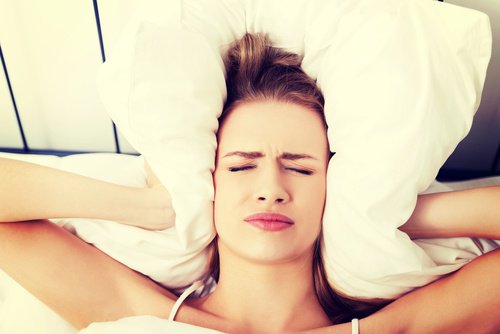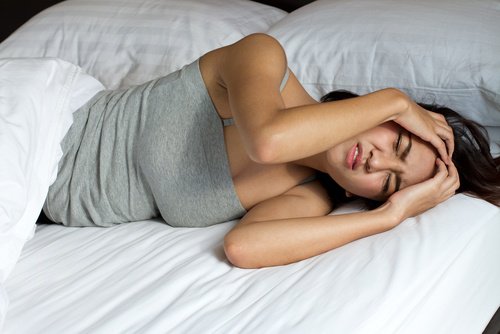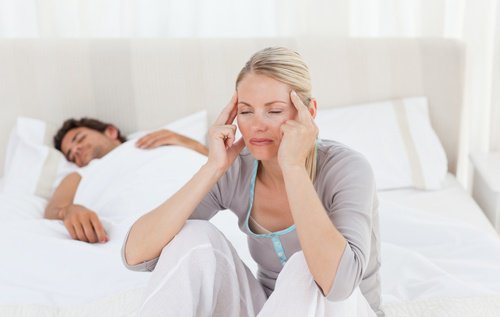Why Do I Wake Up With A Headache?

Headaches or migraines are uncomfortable any time of day. The causes of headaches can depend on when you first feel the discomfort or the intensity of the pain.
In this article, we’ll go over some of the causes of morning headaches.
Why do I wake up with a headache?
If it feels like a drum is beating at your temples when you first wake up, you’re dizzy or unable to open your eyes, it’s important to see your doctor.
Despite the use of pain relievers, the pain may not subside. In fact, in many cases, they can last all day. The most common causes of morning headaches are:
Also see: Relieve Headaches Fast with This Drink
Inflammation of the nasal passages
If the nasal passages behind the nose, eyes and cheekbones are inflamed, you might experience a terrible headache when you sit up to turn off your alarm first thing in the morning.
In these types of cases, you must treat the underlying allergy or infection that’s causing the sinusitis in order to eliminate the symptoms.
Sleep apnea

This condition is defined as “momentary pauses in breathing” while sleeping.
Because the brain isn’t receiving any oxygen during these pauses, it can cause you to wake up with a headache. Classic signs of sleep apnea include dark circles under the eyes and excessive tiredness (despite going to bed early).
If you sleep with someone, ask them if you snore of if they’ve noticed anything unusual during the night, as this can be another symptom of this problem.
Sleep disturbances
Emotional factors such as stress, everyday worries and anxiety can alter the quality of your sleep. Many of us go to bed really late, only to get up too early the next morning. As a result, we do not get the essential 8 hours of sleep we need each night, which also affects the quality of our sleep.
Negative emotions and recurring nightmares can also cause migraines, as well as external factors such as light and noise (a dripping faucet, a street light, a blaring television, snoring, etc.) which disturb your sleep, giving you a headache the next morning.
Muscle tension
If you don’t get enough sleep, you feel tense or you fall sleep in an awkward position, you may suffer from nightmares or insomnia. The neck and shoulder muscles become tense and put pressure on the skull, causing a headache.
Be sure to sleep on a good mattress with an adequate pillow. This will not only help you sleep better, but will also support the entire spinal column, and most important of all, the cervical vertebra.
Overuse of medication
Essentially, we’re referring to the drugs designed to alleviate headaches. When the pain occurs two or more times a week, it’s not uncommon to turn to medication (be it prescription or over the counter).
Overuse of pain relievers produces a counterproductive side effect. This means that the same medications that you take to relieve pain could also be the cause of your morning headaches.
These types of drugs should be reduced or avoided if you want to prevent morning headaches:
- Aspirin
- Paracetamol
- Decongestants
- Pain relievers
- Narcotics
Dehydration

It’s important to remember that we don’t eat or drink throughout the night. Even though the body isn’t as active as it is during the day, it still needs to be properly hydrated.
When you don’t drink enough water, the blood vessels in the head contract to balance fluid levels in the body. This makes it difficult to properly oxygenate the blood and causes headaches.
Grinding your teeth
Bruxism is a very common condition in children (although it also occurs in adults) and is popularly referred to as “grinding” your teeth while sleeping.
This unconscious habit tenses the jaw muscles, and may cause pain and discomfort when we wake up in the morning.
Poor sleeping posture
One of the most common mistakes people make when it comes to getting a good night’s sleep is sleeping in an unnatural position.
This means that if you sleep “curled up” or in a strange position, not only will your head hurt the next morning but so will your back, neck and shoulders, etc.
Keep your head slightly elevated, and try to sleep on your back or side. Avoid sleeping on your stomach. Don’t forget that a proper sleeping posture helps the blood circulate properly, helping to prevent morning headaches.
Blood pressure and diabetes
Both these conditions can trigger a migraine in the morning. This is due to that fact that, in both conditions, your blood vessels dikate, your blood pressure increases and your muscles tense, especially in your head.
You should read: 6 Natural Remedies for Alleviating Low Blood Pressure
The orientation of your bed

Here, we’re referring to the teachings of the ancient discipline of feng shui. According to this oriental philosophy, the head of the bed should always point towards the north in order to promote proper rest and relaxation during the night.
This may have a basis in science: the earth’s magnetic field is thought to act as a magnet on us as we sleep. However, there are no studies proving these claims.
Restless leg syndrome
This syndrome is described as the uncontrollable impulse to move your lower extremities.
Because the muscle spasms keep your brain on constant alert, it can cause sleep disturbances, and may leave you with a headache when you wake up. However, there is currently no concrete evidence to prove a connection between the two.
If you suffer from nausea, vomiting or blurry vision on top of morning headaches, we suggest that you see your doctor.
All cited sources were thoroughly reviewed by our team to ensure their quality, reliability, currency, and validity. The bibliography of this article was considered reliable and of academic or scientific accuracy.
- Tension-type headaches. (2014).
my.clevelandclinic.org/disorders/tension_headaches/hic_tension-type_headaches.aspx - Bendtsen L, et al. (2016). Drug treatment for episodic and chronic tension-type headache. In Pharmacological management of headaches.
link.springer.com/chapter/10.1007/978-3-319-19911-5_9 - Secondary headaches. (2016).
americanmigrainefoundation.org/understanding-migraine/secondary-headaches/ - What are headaches? (2016).
takingcharge.csh.umn.edu/conditions/migraine - Venegas, Pablo., Miranda, Marcelo. (2001). Síndrome de las piernas inquietas. Actualización clínica. https://scielo.conicyt.cl/scielo.php?script=sci_arttext&pid=S0717-92272001000200006
- Boscones Martínez, A. Sanz Sanchez, I. (2009). Diabetes mellitus: Su implicación en la patología oral y periodontal.http://scielo.isciii.es/scielo.php?script=sci_arttext&pid=S0213-12852009000500003
- VV.AA. (2011). Asociación entre Maloclusiones y Posición de la Cabeza y Cuello.https://scielo.conicyt.cl/scielo.php?script=sci_arttext&pid=S0718-381X2011000200002
- Pando Cabrera, Alejandro., Fernandez Concepción, Otman. (1999). Diagnóstico de las cefaleas. http://scielo.sld.cu/scielo.php?script=sci_arttext&pid=S0864-21251999000500011
- Olivera Lea, Irma Regla. (2014). Cefalea crónica diaria por sobreconsumo de medicamentos. http://scielo.sld.cu/scielo.php?script=sci_arttext&pid=S0034-75232014000300001
- Henry Olivi, R. (2013).Apnea del sueño: cuadro clínico y estudio diagnóstico. https://www.sciencedirect.com/science/article/pii/S0716864013701731
- Rodríguez Pérez, M.A., Hervás Núñez, M.J., Porras Alonso, E. PATOLOGÍA INFLAMATORIA DE LAS FOSAS NASALES:RINITIS AGUDAS Y CRÓNICAS. RINITIS ESPECÍFICAS.https://seorl.net/PDF/Nariz%20y%20senos%20paranasales/052%20-%20PATOLOGÍA%20INFLAMATORIA%20DE%20LAS%20FOSAS%20NASALES%20RINITIS%20AGUDAS%20Y%20CRÓNICAS.%20RINITIS%20ESPECÍFICAS.pdf
- Cid, María Loreto. (2014).Cefaleas, evaluación y manejo inicial.https://www.sciencedirect.com/science/article/pii/S07168640147008
This text is provided for informational purposes only and does not replace consultation with a professional. If in doubt, consult your specialist.








